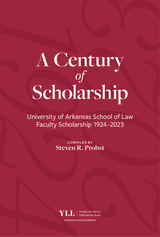
Professor and librarian Steven R. Probst has served as head of public services for the University of Arkansas School of Law’s Young Law Library since 2019. He has taught and written extensively on legal research.
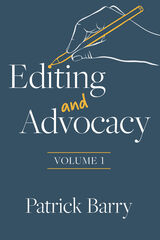
This book— which is based on a popular course taught at the University of Chicago Law School, the University of Michigan Law School, and the UCLA School of Law— is designed to help you become one of those editors. You’ll learn how to edit with empathy. You’ll learn how to edit with statistics. You’ll learn, in short, a wide range of compositional skills you can use to elevate your advocacy and better champion the causes you care about the most.
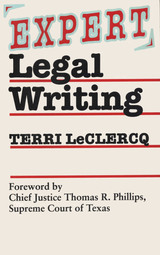
For many years, Terri LeClercq's "Legal Writing" column in the Texas Bar Journal helped polish the prose of lawyers and law students, judges and clerks, paralegals, writing instructors, and legal secretaries. This book collects all the advice she has given in her columns into one authoritative guide for expert legal writing. LeClercq covers everything a legal writer needs to know, from the mechanics of grammar and punctuation to the finer points of style, organization, and clarity of meaning. With her practical, readable, and often humorous advice, those who prepare legal documents can rid their prose of mind-numbing "legalese" and write with the clarity and precision that characterize the very best legal writing.
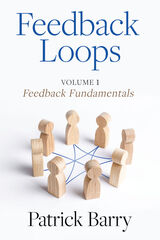
Learning how to give and receive feedback is fundamental to the development of every student and professional. Yet few of us are ever taught anything like “feedback skills.”
This book, which is the first in the Feedback Loops series, is designed to change that. Here is what students who have taken the University of Michigan Law School course on which the series is based have said about it:
-
“One of the most memorable and useful classes I have taken in law school!”
-
“Excellent, full stop.”
-
“This class was always a fun highlight of my week.”
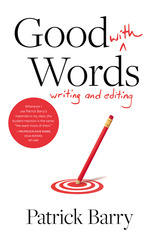

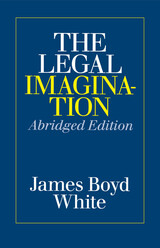
"A fascinating study of the language of the law. . . . This book is to be highly recommended: certainly, for those who find the time to read it, it will broaden the mind, and give lawyers a new insight into their role."—New Law Journal
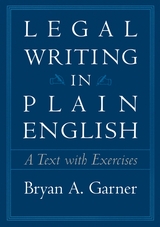
Replete with common sense and wit, the book draws on real-life writing samples that Garner has gathered through more than a decade of teaching in the field. Trenchant advice covers all types of legal materials, from analytical and persuasive writing to legal drafting. Meanwhile, Garner explores important aspects of document design. Basic, intermediate, and advanced exercises in each section reinforce the book's principles. (An answer key to basic exercises is included in the book; answers to intermediate and advanced exercises are provided in a separate Instructor's Manual, free of charge to instructors.) Appendixes include a comprehensive punctuation guide with advice and examples, and four model documents.
Today more than ever before, legal professionals cannot afford to ignore the trend toward clear language shorn of jargon. Clients demand it, and courts reward it. Despite the age-old tradition of poor writing in law, Legal Writing in Plain English shows how legal writers can unshackle themselves.
Legal Writing in Plain English includes:
*Tips on generating thoughts, organizing them, and creating outlines.
*Sound advice on expressing your ideas clearly and powerfully.
*Dozens of real-life writing examples to illustrate writing problems and solutions.
*Exercises to reinforce principles of good writing (also available on the Internet).
*Helpful guidance on page layout.
*A punctuation guide that shows the correct uses of every punctuation mark.
*Model legal documents that demonstrate the power of plain English.
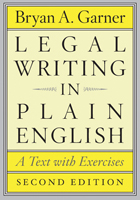
Accessible and witty, Legal Writing in Plain English draws on real-life writing samples that Garner has gathered through decades of teaching experience. Trenchant advice covers all types of legal materials, from analytical and persuasive writing to legal drafting, and the book’s principles are reinforced by sets of basic, intermediate, and advanced exercises in each section.
In this new edition, Garner preserves the successful structure of the original while adjusting the content to make it even more classroom-friendly. He includes case examples from the past decade and addresses the widespread use of legal documents in electronic formats. His book remains the standard guide for producing the jargon-free language that clients demand and courts reward.
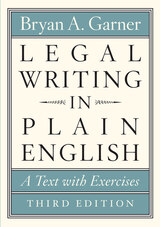
Admirably clear, concise, down-to-earth, and powerful—all too often, legal writing embodies none of these qualities. Its reputation for obscurity and needless legalese is widespread. Since 2001, Bryan A. Garner’s Legal Writing in Plain English has helped address this problem by providing lawyers, judges, paralegals, law students, and legal scholars with sound advice and practical tools for improving their written work. Now the leading guide to clear writing in the field, this indispensable volume encourages legal writers to challenge conventions and offers valuable insights into the writing process: how to organize ideas, create and refine prose, and improve editing skills.
Accessible and witty, Legal Writing in Plain English draws on real-life writing samples that Garner has gathered through decades of teaching experience. Trenchant advice covers all types of legal materials, from analytical and persuasive writing to legal drafting, and the book’s principles are reinforced by sets of basic, intermediate, and advanced exercises in each section.
For this third edition, Garner has retained the structure of the previous versions, with updates and new material throughout. There are new sections on making your writing vivid and concrete and on using graphics to enhance your argument. The coverage and examples of key topics such as achieving parallelism, avoiding legalese, writing effective openers and summaries, and weaving quotations into your text have also been expanded. And the sample legal documents and exercises have been updated, while newly added checklists provide quick summaries of each section.
Altogether, this new edition will be the most useful yet for legal professionals and students seeking to improve their prose.
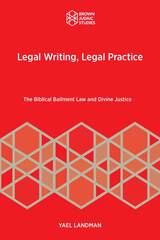

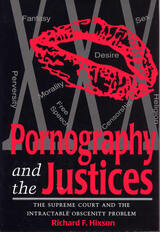
Discussing Supreme Court decisions regarding obscenity, Richard F. Hixson highlights the views of Justices William J. Brennan and John Paul Stevens, borrows from the pioneer decisions of Judge Learned Hand, and consults the work of contemporary First Amendment scholars; finally, though, he relies not on public debate or political machinations but on the justices’ own published opinions, which are, as he says, "the most tantalizing documents of all."
Hixson proceeds chronologically through eleven chapters, with each chapter featuring a specific aspect of the constitutional problem and the approach or solution espoused by a particular justice. Through his case-by-case analysis of the many Supreme Court obscenity rulings, Hixson relates each decision to the temper of the times.
In this investigation of the Supreme Court’s dealings with obscenity, Hixson asks—and answers in detail—a series of pertinent questions. Do Congressional politics and public opinion prejudice the Court’s ability to interpret the Constitution fairly? Must adults be treated the same as children? What are the limits, if any, of "content restriction" on obscene materials? How much "expressive activity" is, or should be, protected by the First Amendment? Does pornography discriminate against women? How protective of the individual can the Supreme Court be and, at the same time, allow as many voices as possible to be heard?
Pornography and the Justices differs from other studies of pornography in its unique focus and its fresh conclusion, which is a composite of views garnered from the Supreme Court justices. As long as there is ample protection of minors and nonconsenting adults, Hixson argues, obscenity should be up to the individual. Separating himself from others who have discussed the issue, Hixson contends that the freedom to speak is as important as the freedom to be heard: it is essential to be able to speak whether or not anyone is listening.
For Hixson, the clear trajectory of Supreme Court opinions implies that the freedom to purchase obscene pornographic matter should be restricted only by time, place, and manner considerations. If a person wants pornography, he or she should be able to get it, albeit perhaps from a higher shelf, in a secluded room, or at a theater clearly marked for adults.
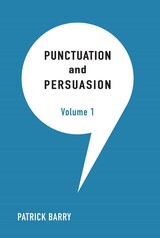
With a little knowledge and a lot of practice, you can do more than just sound more professional when you skillfully use commas, semicolons, and other forms of punctuation. You can, importantly, become more persuasive.
That’s what students who have taken Professor Patrick Barry’s classes at the University of Michigan Law School, the University of Chicago Law School, and the UCLA School of Law have learned, as have the over 100,000 people who have enrolled in his online course “Good with Words: Writing and Editing” on the educational platforms Coursera and FutureLearn.
Now, thanks to this book, you can undergo that same rhetorical transformation. Punctuation doesn’t have to be a pain point. When properly mastered, it can be a powerful tool for all kinds of advocates.
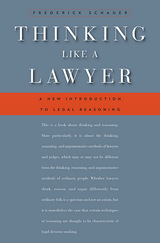
This primer on legal reasoning is aimed at law students and upper-level undergraduates. But it is also an original exposition of basic legal concepts that scholars and lawyers will find stimulating. It covers such topics as rules, precedent, authority, analogical reasoning, the common law, statutory interpretation, legal realism, judicial opinions, legal facts, and burden of proof.
In addressing the question whether legal reasoning is distinctive, Frederick Schauer emphasizes the formality and rule-dependence of law. When taking the words of a statute seriously, when following a rule even when it does not produce the best result, when treating the fact of a past decision as a reason for making the same decision again, or when relying on authoritative sources, the law embodies values other than simply that of making the best decision for the particular occasion or dispute. In thus pursuing goals of stability, predictability, and constraint on the idiosyncrasies of individual decision-makers, the law employs forms of reasoning that may not be unique to it but are far more dominant in legal decision-making than elsewhere.
Schauer’s analysis of what makes legal reasoning special will be a valuable guide for students while also presenting a challenge to a wide range of current academic theories.
READERS
Browse our collection.
PUBLISHERS
See BiblioVault's publisher services.
STUDENT SERVICES
Files for college accessibility offices.
UChicago Accessibility Resources
home | accessibility | search | about | contact us
BiblioVault ® 2001 - 2025
The University of Chicago Press









